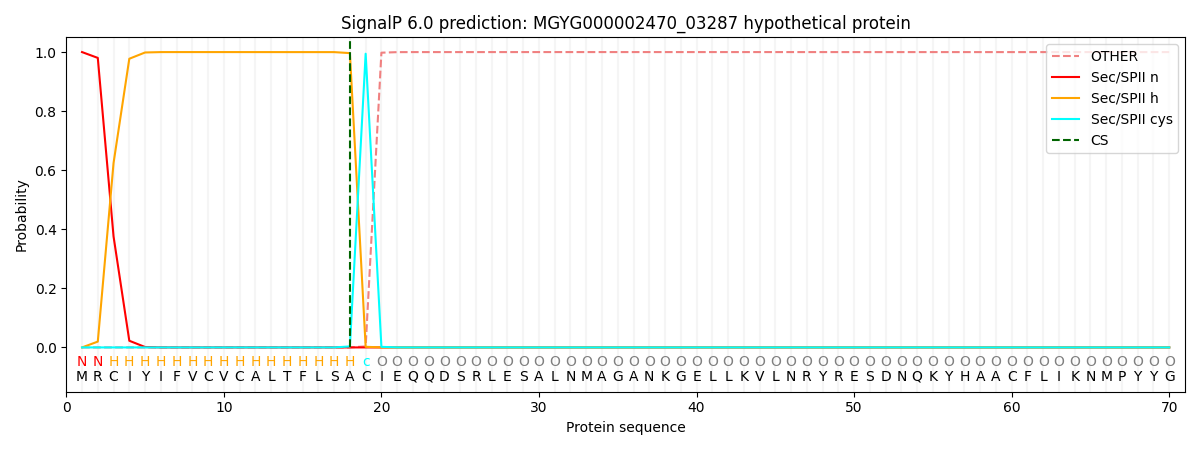You are browsing environment: HUMAN GUT
CAZyme Information: MGYG000002470_03287
You are here: Home > Sequence: MGYG000002470_03287
Basic Information |
Genomic context |
Full Sequence |
Enzyme annotations |
CAZy signature domains |
CDD domains |
CAZyme hits |
PDB hits |
Swiss-Prot hits |
SignalP and Lipop annotations |
TMHMM annotations
Basic Information help
| Species | Bacteroides intestinalis | |||||||||||
|---|---|---|---|---|---|---|---|---|---|---|---|---|
| Lineage | Bacteria; Bacteroidota; Bacteroidia; Bacteroidales; Bacteroidaceae; Bacteroides; Bacteroides intestinalis | |||||||||||
| CAZyme ID | MGYG000002470_03287 | |||||||||||
| CAZy Family | CBM62 | |||||||||||
| CAZyme Description | hypothetical protein | |||||||||||
| CAZyme Property |
|
|||||||||||
| Genome Property |
|
|||||||||||
| Gene Location | Start: 353503; End: 355464 Strand: + | |||||||||||
CAZyme Signature Domains help
| Family | Start | End | Evalue | family coverage |
|---|---|---|---|---|
| CBM62 | 440 | 517 | 6.6e-22 | 0.5877862595419847 |
| CBM62 | 525 | 586 | 2.1e-16 | 0.46564885496183206 |
CDD Domains download full data without filtering help
| Cdd ID | Domain | E-Value | qStart | qEnd | sStart | sEnd | Domain Description |
|---|---|---|---|---|---|---|---|
| pfam01841 | Transglut_core | 8.20e-06 | 192 | 269 | 13 | 94 | Transglutaminase-like superfamily. This family includes animal transglutaminases and other bacterial proteins of unknown function. Sequence conservation in this superfamily primarily involves three motifs that centre around conserved cysteine, histidine, and aspartate residues that form the catalytic triad in the structurally characterized transglutaminase, the human blood clotting factor XIIIa'. On the basis of the experimentally demonstrated activity of the Methanobacterium phage pseudomurein endoisopeptidase, it is proposed that many, if not all, microbial homologs of the transglutaminases are proteases and that the eukaryotic transglutaminases have evolved from an ancestral protease. |
| pfam00754 | F5_F8_type_C | 1.37e-04 | 546 | 628 | 16 | 99 | F5/8 type C domain. This domain is also known as the discoidin (DS) domain family. |
| smart00460 | TGc | 3.13e-04 | 225 | 276 | 1 | 60 | Transglutaminase/protease-like homologues. Transglutaminases are enzymes that establish covalent links between proteins. A subset of transglutaminase homologues appear to catalyse the reverse reaction, the hydrolysis of peptide bonds. Proteins with this domain are both extracellular and intracellular, and it is likely that the eukaryotic intracellular proteins are involved in signalling events. |
CAZyme Hits help
| Hit ID | E-Value | Query Start | Query End | Hit Start | Hit End |
|---|---|---|---|---|---|
| QDO67716.1 | 0.0 | 1 | 653 | 1 | 653 |
| BBK87242.1 | 1.31e-283 | 21 | 653 | 4 | 637 |
| QUT35039.1 | 2.25e-283 | 21 | 653 | 19 | 652 |
| QUT66433.1 | 2.25e-283 | 21 | 653 | 19 | 652 |
| QUT97869.1 | 2.25e-283 | 21 | 653 | 19 | 652 |
PDB Hits download full data without filtering help
| Hit ID | E-Value | Query Start | Query End | Hit Start | Hit End | Description |
|---|---|---|---|---|---|---|
| 2YB7_A | 3.33e-07 | 444 | 516 | 64 | 137 | ChainA, Carbohydrate Binding Family 6 [Acetivibrio thermocellus],2YB7_B Chain B, Carbohydrate Binding Family 6 [Acetivibrio thermocellus],2YFU_A Chain A, Carbohydrate Binding Family 6 [Acetivibrio thermocellus],2YFZ_A Chain A, Carbohydrate Binding Family 6 [Acetivibrio thermocellus],2YG0_A Chain A, Carbohydrate Binding Family 6 [Acetivibrio thermocellus] |
Swiss-Prot Hits help
SignalP and Lipop Annotations help
This protein is predicted as LIPO

| Other | SP_Sec_SPI | LIPO_Sec_SPII | TAT_Tat_SPI | TATLIP_Sec_SPII | PILIN_Sec_SPIII |
|---|---|---|---|---|---|
| 0.000000 | 0.000001 | 1.000053 | 0.000000 | 0.000000 | 0.000000 |
